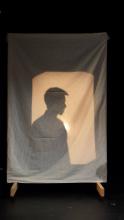In just a couple of days, undergraduate Elizabeth Wu's directorial debut with the Undergraduate Theater Society opens at Hutchinson Hall. Elizabeth is a senior majoring in Drama and English. In addition to her coursework and directorial duties, Elizabeth serves on the Drama BA Council and as the student representative to the School of Drama Advisory Board. This is her second blog post reflecting on her work on David Henry Hwang's 'Yellow Face.'
January 19th, Martin Luther King, Jr. Day, came at an important time for our country. It gave us a period to reflect on our nation’s current events; to think about the dream set out by Dr. King to end racial profiling and violence against people of minority and color. More than ever it gave us pause to think about our own first amendment rights—what we can do (in our own power) to end racial discrimination. It’s in this period of reflection that Yellow Face celebrates its opening in Hutchinson Hall’s Cabaret Theatre.
I never chose this story for its political statement. When I first read David Henry Hwang’s play, what truly caught my attention was the close bond between the story’s central protagonist and his father. Even more so, I was drawn in by their hopes for themselves and hopes for each other; it was their personalities, their jokes, their idiosyncrasies, and their belief in America that resonated with me.
I was drawn in by their hopes for themselves and hopes for each other; it was their personalities, their jokes, their idiosyncrasies, and their belief in America that resonated with me.
This production, as well as recent events, has taught me that the American Dream is not bias-free, or static. Rather, it is a political statement, one that history has subjected to every sort of racial profiling, bi-partisan hatred, terrorism, and ignorance. It was produced in the ever-adapting (and often unfair) political environment that the characters of Yellow Face navigate.
While in some respects we have come a long way since the days of Jim Crow, Hollywood’s Hays Code, and America’s Chinese Exclusion Act, I still acknowledge that we have an even longer way to go. Last summer’s full production of The Mikado by Seattle’s Gilbert & Sullivan Society cast over 40 white actors in the parts of Asian roles. In the media, the limited roles of Asian American parts are still rooted in the old Fu Manchu (evil Asian) stereotypes. Only instead of China, it’s North Korea—and we give him a puppy.
The point here is that when we engineer people to be “the other” (either through the stereotyping of their looks, customs, political views, gender associations, etc.) we are creating an open invitation to incarcerate them without due process of law, pass legislature that denies them equal rights to their own bodies, and make it permissible to commit hate crimes without any legal repercussions.
The point here is that when we engineer people to be “the other” (either through the stereotyping of their looks, customs, political views, gender associations, etc.) we are creating an open invitation to incarcerate them without due process of law, pass legislature that denies them equal rights to their own bodies, and make it permissible to commit hate crimes without any legal repercussions.
So now I ask myself, why Yellow Face? Why this play in the Cabaret Theater? Why now?
I simply believe these issues are too alive, too real, and too palpable to ignore them. I believe we are still desperately seeking a way to come to terms with our own national identity while trying to understand the obvious disparity around us. To me, this is just one of the many facets of our universal human struggle.
What I think Yellow Face shows us is that we are all (in some form or another) the racist, the hater, the fearer, and the ignorer; that we perform these roles in a myriad of different ways, sometimes without even realizing it! We will pass a person on the street and make a rash judgment call, or we will claim innocence from profiling by being colored ourselves, or maybe we disguise it, deem it as another person’s (or community’s) issue. But just like DHH (the protagonist of Yellow Face), we must learn that it is our own personal responsibility; one that we can all remedy together.
What I think Yellow Face shows us is that we are all (in some form or another) the racist, the hater, the fearer, and the ignorer; that we perform these roles in a myriad of different ways, sometimes without even realizing it!
I am a bit sad that Yellow Face production and rehearsals are coming to an end, especially since I’ve been able to learn so much and work with my passionate peer designers, cast, and crew. But as we near our show opening, I can’t help but feel the excitement in the air. I am reminded of a time back in 1974 when a group of undergraduate Drama students roamed the halls of Hutchinson. Just like us, they had big ideas, big dreams, and equally passionate hearts. But because they were unable to get cast in any productions because of their ethnicity, they had to leave the UW School of Drama community in order to produce their own, fulfilling work. These artists would eventually go on to found the first Asian American theater company in Seattle, and they continue to be community leaders today.
In 2015, we now have a show written by an Asian American playwright, cast with a multi-racial ensemble, and produced by the UW Undergraduate Theater Society. You will see actors doing what they do best, designers who brought a very difficult script to life, and School of Drama students actively engaging in American storytelling.
That, to me, is the dream at work.
'Yellow Face' opens January 22 and runs through February 1.

